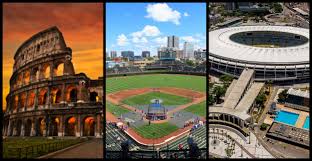
Keep up with the latest news and be part of our weekly giveaways and airtime sharing; follow our WhatsApp channel for more updates. Click to Follow us
Throughout the history of sports, certain venues have transcended their role as mere arenas for competition to become symbols of culture, heritage, and unbridled passion. Iconic sports venues carry with them a rich history, housing unforgettable moments, legends, and memories that shape not just the sports they host but the very identity of the communities that surround them.
These venues aren’t just places to watch a game; they are living testaments to the evolution of sports, where every corner and seat tells a story of triumph, heartbreak, and human spirit.
1. Wrigley Field – Chicago, USA (Baseball)
Opened in 1914, Wrigley Field is the second-oldest Major League Baseball stadium, making it one of the most beloved sports venues in the world. Known for its ivy-covered outfield walls, this iconic ballpark in Chicago has been home to the Chicago Cubs for over a century. The history of Wrigley Field is as much about its atmosphere as it is about the games played within it.
Over the decades, it has witnessed historic moments, including the Cubs’ long-awaited World Series victory in 2016 after a 108-year drought. Wrigley’s charm lies in its enduring traditions, such as the singing of “Take Me Out to the Ballgame” during the seventh-inning stretch and the famous rooftop bleachers across the street, where fans can watch games from the rooftops of nearby buildings. Wrigley Field remains a shrine to baseball’s past while embracing modern advancements.
2. Madison Square Garden – New York City, USA (Multi-sport)
Nicknamed “The Mecca of Basketball,” Madison Square Garden (MSG) has been an integral part of New York City’s sports and entertainment landscape since it opened in 1968. MSG is unique in that it serves not only as a home to the New York Knicks (basketball) and New York Rangers (hockey) but also as a venue for concerts, political events, and cultural gatherings.
For further information on sport secret and greatest sport icon click here
Over the years, MSG has hosted iconic events like the “Fight of the Century” between Muhammad Ali and Joe Frazier in 1971 and countless NBA and NHL playoff games. The venue’s ability to host major events in various sports, from boxing to wrestling to concerts, has cemented its place as a symbol of New York’s vibrant and dynamic energy.
3. Wembley Stadium – London, England (Football)
Wembley Stadium, opened in 2007 after the original stadium was demolished, is often considered the “home” of English football. The original Wembley, built in 1923, hosted historic events such as the 1966 FIFA World Cup final, where England won its first and only World Cup title. The new Wembley, built at a cost of £798 million, is one of the largest stadiums in Europe and features a distinct 134-meter-high arch that has become synonymous with the venue.
Wembley has witnessed countless legendary moments, from club football finals like the FA Cup to major concerts and events. The stadium’s rich history, combined with its modern facilities, makes it an emblem of footballing culture and a place where historic achievements are etched into the minds of fans.
4. The Colosseum – Rome, Italy (Ancient Gladiatorial Combat)
Though no longer in use for modern sports, the Colosseum in Rome remains one of the most iconic venues in history, setting the stage for sports as we know them today. Built around AD 70–80, the Colosseum could hold up to 80,000 spectators and was used for gladiatorial contests and public spectacles, including animal hunts, mock sea battles, and executions.
The Colosseum symbolizes the ancient origins of competitive events and sports. It also reflects the deep connection between entertainment, spectacle, and human emotion a connection that continues in modern arenas around the world today. While no longer in operation, the Colosseum remains a powerful reminder of the cultural importance of sporting arenas in history.
5. The Maracanã Stadium – Rio de Janeiro, Brazil (Football)
The Maracanã Stadium is a legendary venue in world football, located in Rio de Janeiro, Brazil. Opened in 1950 to host the FIFA World Cup, it has become synonymous with Brazilian football culture. The Maracanã holds a special place in the hearts of fans, having witnessed Brazil’s emotional victories, including its 1970 World Cup win, and heartbreaks, like the shocking 1950 World Cup final loss to Uruguay, known as the “Maracanazo.”
For further information on sport secret and greatest sport icon click here
Renovated several times for various events, the Maracanã has hosted numerous major football events, including the 2014 World Cup final and the 2016 Summer Olympics. With its massive capacity (over 78,000 spectators), the stadium remains one of the most iconic football venues, steeped in tradition and passion for the sport.
6. Fenway Park – Boston, USA (Baseball)
Opened in 1912, Fenway Park is the oldest Major League Baseball stadium in the United States and home to the Boston Red Sox. Known for its “Green Monster” the towering left-field wall Fenway Park has been a focal point of Boston’s sports culture for more than a century. The venue’s intimate feel, with seats close to the action, creates a unique fan experience, which has helped solidify Fenway as one of the most cherished sports landmarks in the country.
The Red Sox’s iconic moments, such as breaking the “Curse of the Bambino” in 2004 with their first World Series title in 86 years, are forever tied to Fenway’s hallowed grounds. Fenway Park has maintained much of its historic charm, resisting modern renovations that might detract from its original character. It remains a living piece of baseball history.
7. Marlins Park (LoanDepot Park) – Miami, USA (Baseball)
Though newer than other iconic venues, Marlins Park (now known as LoanDepot Park) in Miami, opened in 2012, has already made its mark as a modern sports venue with a unique design and flair. The stadium is distinctive for its retractable roof, climate-controlled environment, and modern aesthetic that blends both function and visual appeal.
The park was designed to accommodate the diverse and passionate Miami fan base, integrating elements of the local culture, including a massive sculpture behind center field that showcases the region’s colorful and artistic spirit. While its history is still being written, LoanDepot Park has quickly become an essential part of Miami’s sports identity.
8. The Stade de France – Paris, France (Multi-sport)
Opened in 1998 for the FIFA World Cup, the Stade de France is one of the most important multi-purpose sports stadiums in France. Located just north of Paris, this massive venue has hosted several key sporting events, including the 1998 World Cup final, where France triumphed over Brazil to win its first-ever World Cup.
For further information on sport secret and greatest sport icon click here
In addition to hosting major international football and rugby matches, the Stade de France has become an iconic venue for concerts, festivals, and events of national significance. The stadium’s design, which blends modernity with the energy of France’s sports culture, helps maintain its reputation as a historic site that continues to produce unforgettable moments.
Iconic sports venues are more than just places where athletes compete; they are temples of culture, history, and passion. From the ancient Colosseum in Rome to modern stadiums like the Stade de France and Marlins Park, these venues represent the evolution of sport as a cultural phenomenon.
Each of these venues has witnessed some of the most unforgettable moments in sports history, contributing to their status as hallowed grounds where legends are made and memories are created for fans across the world.
Please don’t forget to “Allow the notification” so you will be the first to get our gist when we publish it.
Drop your comment in the section below, and don’t forget to share the post.








